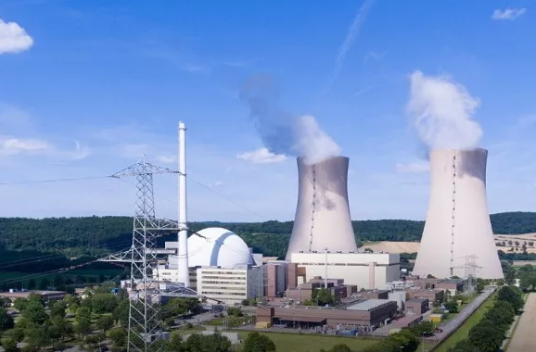Industry news
The end of nuclear power in Germany
release time:2023-05-04
Germany has announced the closure of its last three nuclear power plants, ushering in a nuclear-free era of energy supply. As early as 2002, the German government revealed its intention to eliminate nuclear power and promote energy transformation. After the Fukushima nuclear power plant accident in Japan in 2011, Germany significantly accelerated the process of nuclear decommissioning. In the current energy supply shortage, Germany still chose to enter the energy "nuclear-free era", its energy supply system is about to change. On April 13, the German government announced that it would shut down the only three remaining nuclear power plants, namely Emsland in Lower Saxony, Isar 2 in Bavaria and Neckvesterheim 2 in Baden-Wurttemberg, as soon as possible. In a statement, the German government said that shutting down the three plants would mark the official end of nuclear power. "The risks of nuclear energy use can last for decades, and the move to shut down nuclear plants will significantly improve nuclear safety." It is understood that Germany has been using nuclear power for more than half a century, Germany's first nuclear power plant in 1960 was put into operation. However, in the past decades, there have been a number of nuclear power plant safety accidents around the world. Influenced by this, in 2011, the German government passed the "accelerate the phase-out of nuclear power" plan and announced the complete shutdown of nuclear power plants in Germany by 2022. In response to a severe energy supply crisis in the first half of last year caused by the conflict between Russia and Ukraine, the German government said last autumn that it would extend the operation of nuclear power plants by several months. On April 15 this year, nuclear power officially quit the stage of German energy history. "This is the end of an era," Rwe Energy, the German power giant that operates Emsland, said in a public statement. Rwe CEO Markus Kreber further pointed out that nuclear power has been a controversial topic in Germany in recent decades. Indeed, even after Germany's "nuclear retreat", there are still dissenting voices within the country. Markus Sodel, premier of Bavaria, has proposed to the federal government a change in the law that would allow the state to continue operating nuclear power plants in its jurisdiction, Reuters reported. In his view, Germany needs to use as many energy sources as possible before the transition to renewable energy is successful. But Germany's federal environmental authority ultimately rejected the state's request to continue operating nuclear power. As Europe's largest economy moves to completely phase out nuclear power, Germany is getting a mixed reception. Facing the end of the "nuclear power era", many European environmental protection agencies and some scholars agree that Germany has avoided the potential risk of nuclear accidents. Volk Kashnin, a professor of renewable energy at the Berlin School of Technology and Economics, supports Germany's decision to shut down reactors. He says nuclear power is a risky technology. As global economic uncertainty grows, so does the risk of using nuclear energy. At the same time, energy experts and businessmen say Germany's move is likely to push up the cost of domestic energy supplies, which is not conducive to dealing with the current energy supply crisis. George Zuckermann, a climate and energy expert at Bruegel, a Brussel-based climate think tank, was quoted by The New York Times as saying: "The three nuclear plants Germany has announced to shut down are actually quite safe and will provide Germany with low-carbon electricity at relatively low cost for many years to come. For Germany, shutting down nuclear power plants would be costly." Given potential energy shortages and high prices, Germany must "expand its energy supply, not impose further restrictions," Peter Adrian, head of the German Chamber of Commerce, told the Rheinische Post newspaper. "Nuclear power is one of the cornerstones of today's carbon-free energy system," AP quoted Peter Fox-Penner, of Boston University's Institute for Sustainable Energy, as saying. "While energy efficiency, wind and PV will be the mainstream approach in the future, it makes more sense to continue with nuclear power in the interim." At the same time, European countries such as Britain, Finland and France are taking the opposite approach, not only building more nuclear power facilities, but also actively developing new nuclear power technologies. The only three nuclear power plants left in Germany contributed about 6 percent of electricity supply in 2022, according to data. How to fill the power supply gap after "nuclear withdrawal" has become the focus of the industry. Robert Habeck, Germany's minister for Economic Affairs and Climate Action, noted that the German government has taken a number of steps to ensure energy security in Germany. "First, ensure adequate gas reserves and build new LNG terminals on the north coast of Germany. Second, Germany is gradually improving its grid performance. Finally, the massive expansion of renewable energy provides an additional guarantee for Germany's energy security. In addition, the German government has made policies to this end and will adjust the legislation if necessary. In the future, RWE will not only expand its renewable energy sector, but also build gas-fired power plants that can run on hydrogen as soon as possible to ensure energy security after coal is phased out in Germany by 2030, said Markus Kreber. But industry estimates suggest that Germany is still far short of its climate goals. Simon Muller, a researcher at AgoraEnergiewende, a German think tank, points out that while Germany has been planning for a decade to phase out nuclear power, it is clearly ill-prepared to promote the expansion of renewables and needs to "go all out" to build enough onshore wind. German Chancellor Gerhard Scholz has called for "four to five turbines a day" to be installed in the coming years in order to meet the goal of generating 80 percent of its electricity from renewable sources by 2030. But in fact, last year, Germany added only 551 new typhoon units, making expansion a daunting task. The shutdown of nuclear power plants in Germany is likely to lead to a rise in carbon emissions from the energy sector that is only likely to be offset by an accelerated expansion of photovoltaic and wind installations in coming years, The New York Times cited climate and energy experts as saying.

 Service Hotline:133-9305-7858,If you are interested or in doubt, please call!
Service Hotline:133-9305-7858,If you are interested or in doubt, please call!
YuHe Technology - dedicated to serve you!
Keywords:Nuclear Industry,Nuclear medicine,Intervention protection,Lead material







